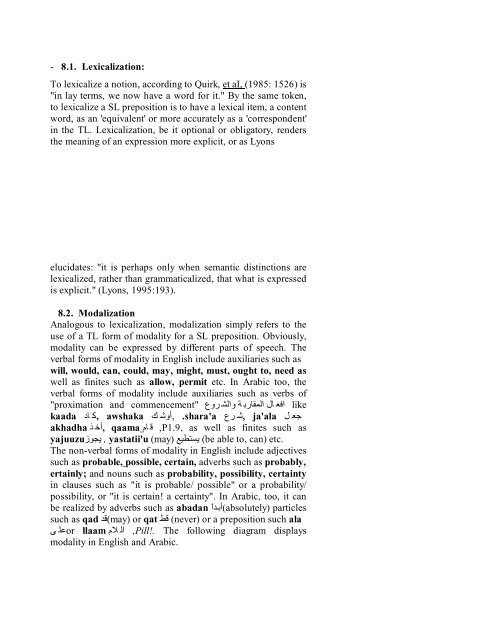424_2061_A.B.
424_2061_A.B.
424_2061_A.B.
- No tags were found...
You also want an ePaper? Increase the reach of your titles
YUMPU automatically turns print PDFs into web optimized ePapers that Google loves.
- 8.1. Lexicalization:To lexicalize a notion, according to Quirk, et aI, (1985: 1526) is"in lay terms, we now have a word for it." By the same token,to lexicalize a SL preposition is to have a lexical item, a contentword, as an 'equivalent' or more accurately as a 'correspondent'in the TL. Lexicalization, be it optional or obligatory, rendersthe meaning of an expression more explicit, or as Lyonselucidates: "it is perhaps only when semantic distinctions arelexicalized, rather than grammaticalized, that what is expressedis explicit." (Lyons, 1995:193).8.2. ModalizationAnalogous to lexicalization, modalization simply refers to theuse of a TL form of modality for a SL preposition. Obviously,modality can be expressed by different parts of speech. Theverbal forms of modality in English include auxiliaries such aswill, would, can, could, may, might, must, ought to, need aswell as finites such as allow, permit etc. In Arabic too, theverbal forms of modality include auxiliaries such as verbs of"proximation and commencement" likekaada , awshaka , .shara'a , ja'ala akhadha , qaama ,P1.9, as well as finites such asyajuuzu , yastatii'u (may) (be able to, can) etc.The non-verbal forms of modality in English include adjectivessuch as probable, possible, certain, adverbs such as probably,ertainly; and nouns such as probability, possibility, certaintyin clauses such as "it is probable/ possible" or a probability/possibility, or "it is certain! a certainty". In Arabic, too, it canbe realized by adverbs such as abadan (absolutely) particlessuch as qad(may) or qat (never) or a preposition such ala or llaam ,Pill!. The following diagram displaysmodality in English and Arabic.
















